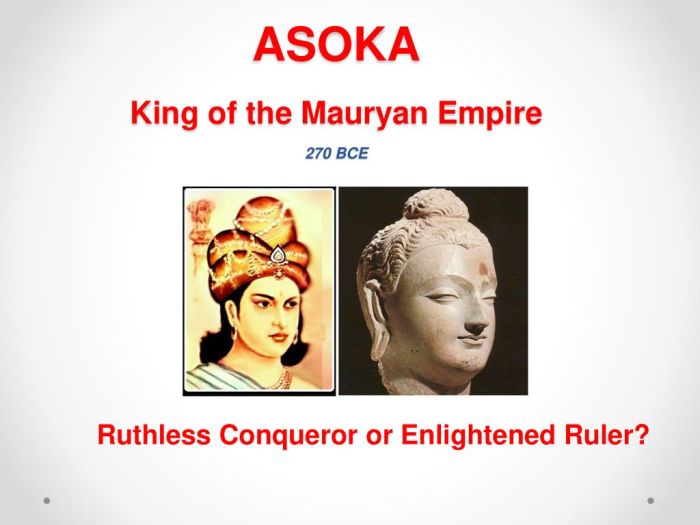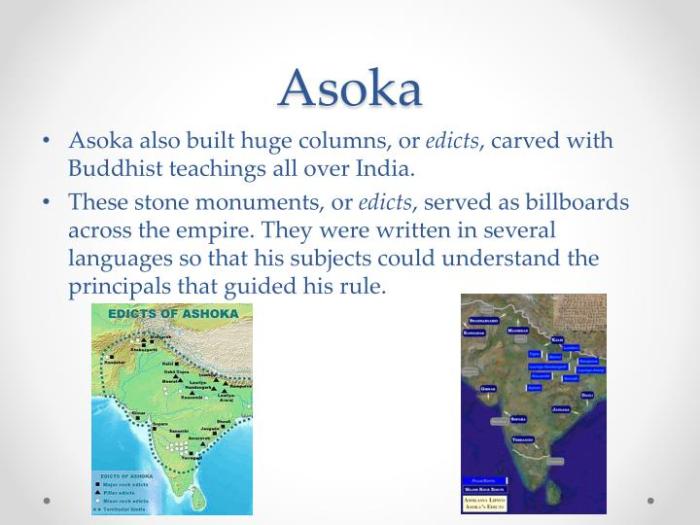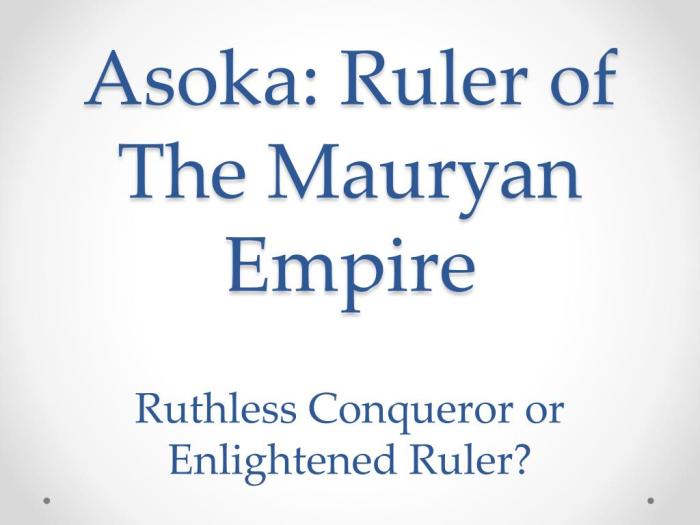Asoka ruthless conqueror or enlightened ruler – Asoka: Ruthless Conqueror or Enlightened Ruler? This question has intrigued historians and scholars for centuries, and the answer lies in the complex and multifaceted life of one of India’s most enigmatic rulers. From his early military conquests to his profound conversion to Buddhism, Asoka’s reign marked a watershed moment in Indian history, leaving an enduring legacy that continues to inspire and challenge.
Born into the royal family of the Mauryan Empire, Asoka ascended to the throne in 268 BCE. His early reign was marked by ruthless military campaigns that expanded the empire’s reach across the Indian subcontinent. However, a pivotal event in 261 BCE, the bloody Battle of Kalinga, transformed Asoka’s life forever.
Historical Context: Asoka Ruthless Conqueror Or Enlightened Ruler

The Mauryan Empire, founded by Chandragupta Maurya in the 4th century BCE, was one of the largest and most powerful empires in ancient Indian history. Asoka, the grandson of Chandragupta, ascended to the throne in 268 BCE and ruled for approximately 37 years.
His reign marked a significant turning point in Indian history, both politically and culturally.
Asoka’s reign witnessed a remarkable transformation in the empire’s policies and governance. His early military conquests earned him the title “Ruthless Conqueror,” but his subsequent conversion to Buddhism led to a profound shift in his approach to ruling. Asoka became an ardent follower of the Buddhist principles of non-violence, compassion, and Dharma, which had a profound impact on his governance and policies.
Early Life and Military Conquests
Asoka was born around 304 BCE to Bindusara, the son of Chandragupta Maurya. As a young prince, Asoka gained a reputation for his military prowess and administrative skills. He played a key role in suppressing rebellions and expanding the Mauryan Empire.
Asoka’s most notable military conquest was the Kalinga War in 261 BCE. The war resulted in a decisive victory for the Mauryans, but at a great cost in human life. The carnage and suffering witnessed during the war had a profound impact on Asoka, leading to his conversion to Buddhism.
Conversion to Buddhism and Transformation
The Kalinga War proved to be a pivotal moment in Asoka’s life. The horrors of war led him to question the value of conquest and violence. Around 260 BCE, Asoka converted to Buddhism and embraced its teachings of non-violence, compassion, and Dharma.
Asoka’s conversion had a profound impact on his rule and policies. He abandoned his former aggressive approach and adopted a policy of peace and reconciliation. He renounced warfare and dedicated himself to promoting the welfare of his subjects.
Dharma and Governance
Asoka’s concept of Dharma, influenced by Buddhism, became the guiding principle of his governance. Dharma, as understood by Asoka, encompassed ethical conduct, righteousness, and respect for all living beings.
Asoka’s edicts, inscribed on rocks and pillars throughout his empire, reflected his Buddhist principles. These edicts emphasized the importance of non-violence, tolerance, and compassion. Asoka also promoted social welfare measures such as the construction of hospitals, roads, and water reservoirs.
Cultural and Social Reforms, Asoka ruthless conqueror or enlightened ruler
Asoka’s cultural and social reforms aimed to promote harmony and reduce suffering within his empire. He encouraged religious tolerance and respect for all faiths.
Asoka also implemented measures to improve the lives of his subjects. He abolished slavery, prohibited the killing of animals, and established a system of social welfare that provided support to the poor and needy.
Legacy and Impact
Asoka’s legacy as both a ruthless conqueror and an enlightened ruler is complex and multifaceted. His early military campaigns earned him the title “Ruthless Conqueror,” but his conversion to Buddhism led to a profound transformation in his rule and policies.
Asoka’s reign marked a turning point in Indian history. His adoption of Buddhist principles had a lasting impact on Indian society and culture. His edicts and reforms promoted non-violence, tolerance, and social welfare, shaping the ethical and moral values of subsequent generations.
Question Bank
What was Asoka’s most significant military victory?
The Battle of Kalinga, which resulted in the conquest of the Kalinga kingdom.
What event led to Asoka’s conversion to Buddhism?
The horrors he witnessed at the Battle of Kalinga.
What was Asoka’s concept of Dharma?
A set of ethical principles based on Buddhist teachings, emphasizing non-violence, compassion, and social harmony.


